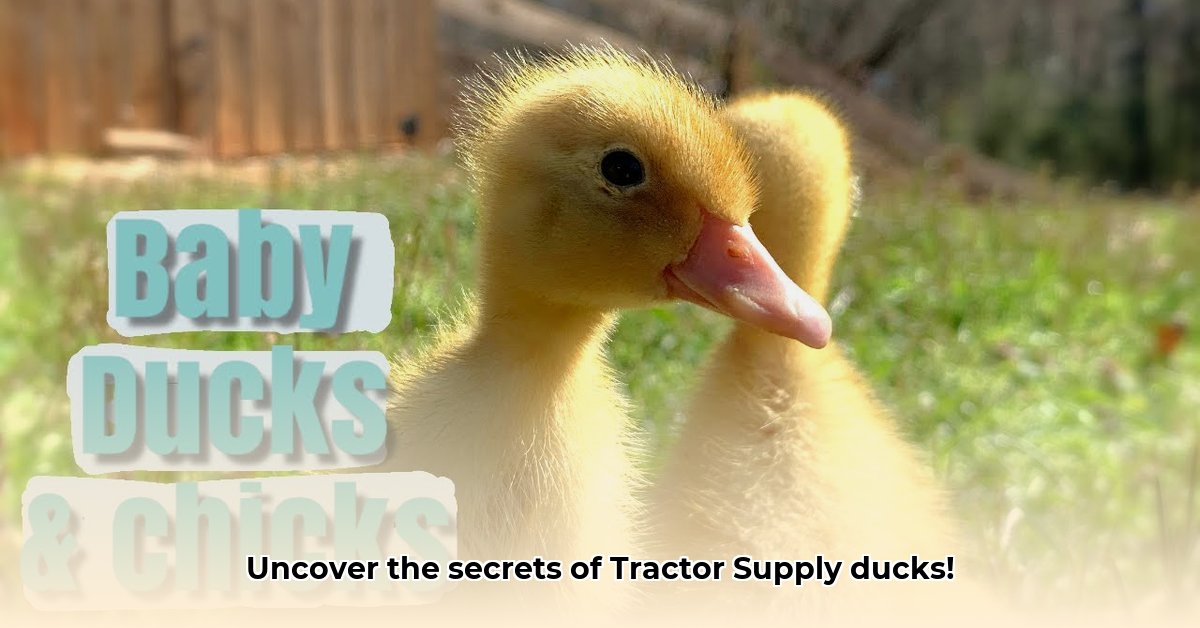
Are you considering adding ducks to your backyard flock? Tractor Supply is a common source for ducklings, but knowing their age and how to care for them is essential. This guide provides actionable information for responsible duck ownership, from selecting the right breed to minimizing environmental impact. For information on chick ages, see this helpful guide on chick ages at Tractor Supply.
The Facts: Ducklings at Tractor Supply
Ducklings at Tractor Supply are typically 24 to 28 days old. They're already past the most fragile newborn stage, ready to thrive in a prepared environment. Common breeds available include Pekins (known for meat production), Indian Runners (renowned for egg-laying), and Cayugas (a dual-purpose breed). Availability varies by location and season, with spring and autumn generally offering the widest selection.
Choosing Your Ducklings: A Step-by-Step Guide
Bringing home ducklings is an exciting but significant commitment. Careful planning ensures your new feathered friends thrive.
Step 1: Breed Selection: Consider your goals. Do you prioritize egg production, meat, or simply companionship? Different breeds excel in these areas. Pekins are excellent meat birds, while Khaki Campbells are prolific layers. Research breed characteristics and select one that aligns with your goals and resources.
Step 2: Building a Suitable Habitat: A secure, well-ventilated coop is essential. Ensure ample space, clean dry bedding, and access to clean water. Predator proofing is crucial. Consider the size of your property; larger breeds need more space for foraging. A well-designed coop contributes significantly to the health and happiness of your ducks.
Step 3: Daily Care: Provide fresh, clean water daily (ducks love to bathe!). Ensure consistent access to high-quality duck feed formulated for their age and breed. Regularly monitor their health, checking for lethargy, loss of appetite, or changes in droppings. Early detection of illness is vital.
Step 4: Recognizing Health Issues: Watch for signs of illness, such as lethargy, loss of appetite, or changes in droppings. Consult a veterinarian immediately if you observe any concerning symptoms.
The Broader Picture: Sustainable Duck Farming
Raising ducks impacts the environment. While backyard farming can be sustainable, responsible practices are vital. The environmental footprint includes feed production and waste management. Sustainable feed sources, like locally grown grains or insect-based protein, reduce environmental impact. Efficient waste management, including composting, minimizes pollution and provides fertile garden soil. Transparency in the supply chain, including knowledge about the ducklings’ feed origin and raising practices, is essential. By carefully considering these factors, you contribute to a more sustainable way of life.
Beyond Tractor Supply: Exploring Local Options
While Tractor Supply offers convenience, consider sourcing ducklings from local farms. This allows for direct observation of farming practices, ensuring ethical and sustainable sourcing. Local farms often offer greater breed diversity and personalized advice. Weigh the convenience of Tractor Supply against the increased transparency and potential benefits of buying from a local farm.
Risk Mitigation and Responsible Ownership
Raising ducks involves inherent risks. Proactive strategies can minimize these risks:
| Risk Category | Likelihood | Impact | Mitigation Strategies |
|---|---|---|---|
| Disease Outbreaks | Moderately High | Very High | Biosecurity (preventing outside contact), vaccination (if recommended by a veterinarian), prompt veterinary care |
| Predator Attacks | Moderate | Very High | Secure coop, predator-deterrent measures |
| Welfare Concerns | Low | Moderate | Ample space, enrichment (toys, foraging areas), balanced nutrition. |
| Environmental Impact | Low | Moderate | Responsible waste management (composting), sustainable feed sources, minimizing water usage |
Responsible duck ownership is a continuous learning process. Stay informed, adapt your practices, and enjoy the rewarding experience of raising healthy, happy ducks.